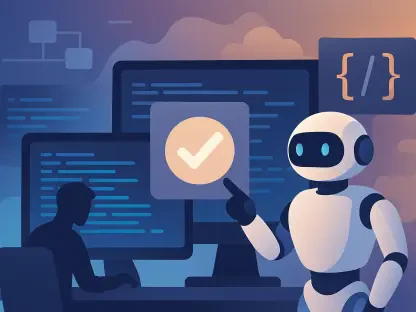The intricate landscape of software development is witnessing a significant transformation spurred by the advent of artificial intelligence (AI) and automation technologies. Recent insights gleaned from a survey involving 555 software executives conducted by CIO Dive for OutSystems and KPMG reveal that the implementation of these technologies is profoundly influencing the pace and quality of software development. Highlighting the practical impacts, 75% of respondents reported up to a 50% reduction in development time. Furthermore, over half of the respondents indicated observable improvements in application quality, characterized by fewer bugs and enhanced performance.
Accelerated Development Cycles Through AI
Reducing Development Time
According to the survey, a substantial 75% of software executives reported that AI and automation have led to a reduction in development time by up to 50%. These technologies are instrumental in streamlining various tasks that were traditionally time-consuming. Automation tools are now capable of handling code generation, documentation, and even user-interface design, which significantly cuts down the time developers need to spend on these repetitive tasks. This newfound efficiency allows development teams to tackle more projects simultaneously, effectively accelerating the overall development cycle.
The adoption of generative AI is particularly noted for its ability to assist in code writing and testing, thereby making the coding process more efficient. However, Rodrigo Coutinho, AI Project Manager at OutSystems, points out that comprehensive integration of generative AI into all phases of the software development lifecycle (SDLC) remains a challenge. Issues such as workflow integration difficulties and the absence of adequate AI expertise within development teams contribute to this complexity. Despite these hurdles, the promise of reduced development times is a compelling incentive for continued investment and exploration of AI capabilities.
Improved Application Quality
Beyond merely speeding up development, AI and automation are also enhancing the quality of the applications being developed. More than half of the survey respondents (56%) indicated that these technologies have resulted in applications with fewer bugs and better overall performance. This improvement is not just a byproduct of faster development cycles but also the result of intelligent systems that can predict potential issues and suggest optimized solutions during the development process.
Generative AI’s probabilistic nature can introduce a level of creativity and innovation that was previously unattainable. However, this also means that the outputs require thorough validation to ensure accuracy and reliability. Over time, as domain-specific large language models (LLMs) become more prevalent, the precision of AI suggestions is expected to increase, leading to even more robust applications. Although immediate improvements in code quality might be modest, the long-term projection for AI-driven development indicates a trend toward higher-quality software with fewer vulnerabilities.
Addressing the Challenges of AI Integration
Navigating Workflow Integration and Skills Gap
While the benefits of AI in software development are evident, integrating these technologies seamlessly into existing workflows poses significant challenges. A considerable 38% of executives identified workflow integration as a primary obstacle. The disruption caused by integrating new AI tools into established development practices requires thoughtful planning and execution. Organizations need to ensure that the transition to an AI-augmented development environment does not hinder productivity or compromise project timelines.
In addition to workflow integration issues, a notable 39% of respondents reported a lack of AI expertise within their development teams. This skills gap necessitates investment in training and development programs to equip existing staff with the necessary knowledge to effectively leverage AI tools. Companies may also consider recruiting new talent with specialized skills in AI, including emerging roles such as prompt engineers. This strategic approach can help bridge the skills gap and maximize the potential of AI in software development.
Managing Privacy, Security, and Compliance
Despite the enthusiasm around AI, concerns about data privacy and security remain prevalent, with 56% of executives citing these issues as significant barriers. The integration of AI tools often involves handling vast amounts of data, raising concerns about data breaches and unauthorized access. Ensuring that AI systems comply with stringent data privacy standards and security protocols is paramount to mitigating these risks.
Furthermore, regulatory and compliance challenges add another layer of complexity. About 42% of respondents acknowledged these challenges, highlighting the need for robust governance frameworks to navigate the regulatory landscape. Companies must stay abreast of evolving regulations to ensure that their AI-augmented development practices remain compliant with local and international laws. Balancing innovation with regulatory adherence is crucial for the sustainable adoption of AI in software development.
The Future Landscape of AI in Development
Investment and Emerging Roles
Despite the challenges, the survey indicates a strong commitment to AI investment among software executives. An overwhelming 93% of respondents plan to increase their investment in AI-augmented tools over the next two years. This growing investment underscores the confidence in AI’s potential to revolutionize the software development landscape. Specifically, 71% of executives intend to integrate AI into application development and SDLC management, further embedding these technologies into the core of development operations.
The future also promises the emergence of new roles within development teams, tailored specifically to harness AI capabilities. Nearly half of the survey respondents (47%) anticipate the creation of a new category of developers proficient in AI skills such as prompt engineering. Additionally, 43% expect an expansion in the responsibilities of existing developers as they adapt to working alongside AI tools. This evolution in roles and responsibilities signifies a shift towards a more collaborative approach between human developers and AI systems.
Strategic Adoption and Governance
The complex field of software development is experiencing notable changes due to the rise of artificial intelligence (AI) and automation technologies. A recent survey by CIO Dive for OutSystems and KPMG, which included 555 software executives, sheds light on the profound influence these technologies are having on the software development lifecycle. According to the survey, an impressive 75% of respondents have observed up to a 50% reduction in development time, thanks to the adoption of AI-driven tools and automated processes. Additionally, more than half of those surveyed noted significant improvements in the quality of their applications. This enhancement in quality is evidenced by a decrease in bugs and glitches, paired with better overall performance. These findings underscore the transformative potential of AI and automation in making software development more efficient and reliable, heralding a new era of innovation in the industry. As businesses increasingly integrate these advanced technologies, the landscape of software creation will continue to evolve, promising even greater efficiencies and breakthroughs.









